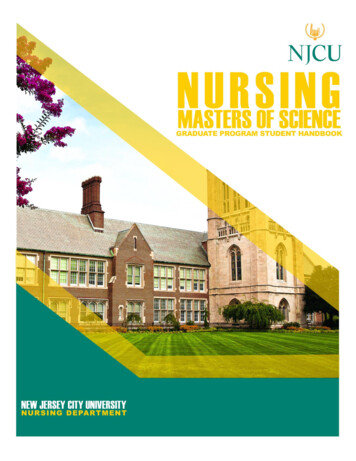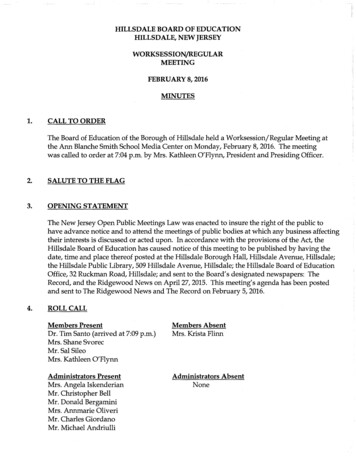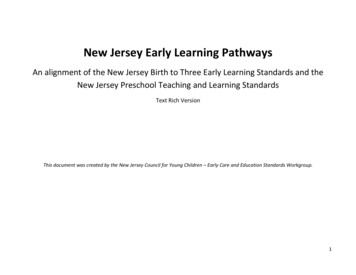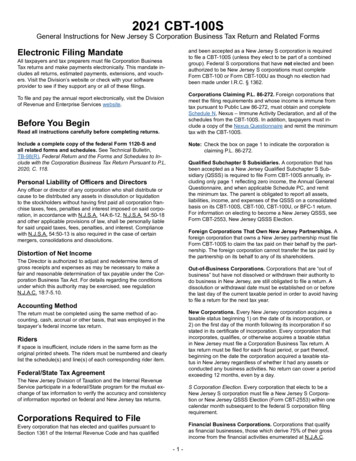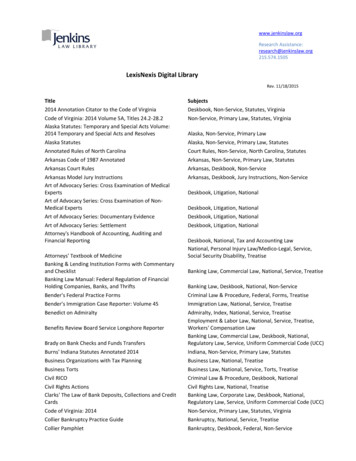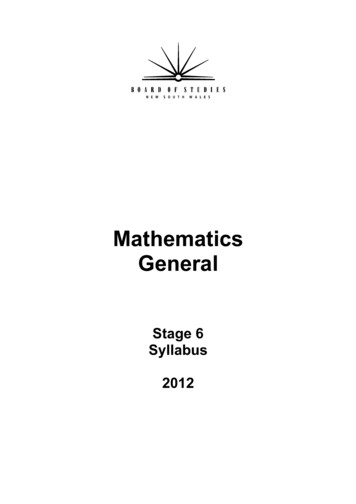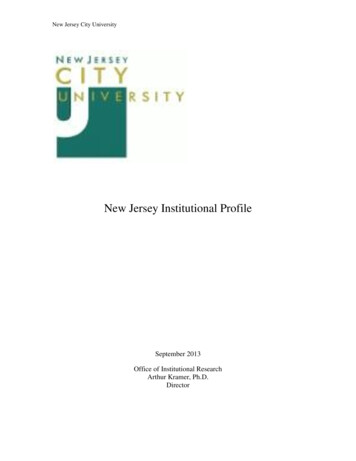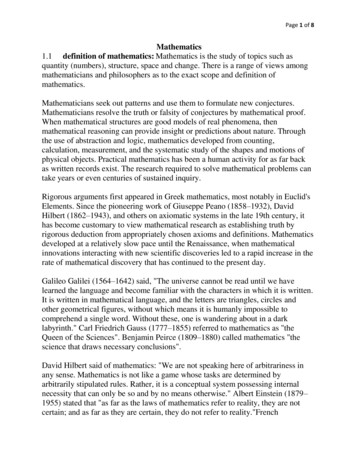
Transcription
NEW JERSEY CITY UNIVERSITYMATHEMATICS DEPARTMENT: ACADEMIC FOUNDATIONSMA098 – ALGEBRA FOR COLLEGE SYLLABUSDepartment Phone Number: 201-200-3201I. Required Textbook: Beginning Algebra, Tobey, Slater, Blair, and Crawford; 2nd CustomEdition, Pearson\Prentice Hall, 2012.MyMathLab access: MyMathLab is required. New textbooks purchased at the NJCU bookstoreinclude MyMathLab access. It may not be included with the purchase of a used book, and maynot be included with a new book purchased at a different bookstore. MyMathLab access codescan be purchased online for approximately 80 or through the NJCU bookstore. MyMathLabcontain a copy of the eBook. If a student is repeating the course, a new code doesn’t have to bepurchased as long as the course is taken within an year.II. Course Description Contents: This course is an introduction to algebra which concentrates on graphicrepresentation, problem solving, and the use and manipulation of polynomials and otheralgebraic expressions to model and interpret real-life situations. The central themes are theapplications of linear and quadratic relationships. Credits: Algebra for College is a 4-credit non-college course. Instructional Methodology: This course is taught in the classroom as a lecture/discussion course. Placement: Placement into this course is determined by the results of Academic AdvisementPlacement Testing/ACCUPLACER, by the results of the Math Department Confirming Exam,or by the result of the Math Department placement exam.Prerequisite: Successful completion of MA 095 – Basic College Math or the equivalent.III. Course Objectives1. To improve the students’ ability to simplify and evaluate algebraic expressions.2. To increase the students’ ability to solve and graph linear equations and inequalities.3. To reinforce students’ knowledge of polynomials, roots and graphs.4. To increase students’ knowledge of operations on polynomials.5. To introduce methods of solving and graphing quadratic equations.6. To increase the students’ ability to apply algebraic skills to solving application problems.7. To prepare students for Intermediate Algebra or Fundamentals of Math.Specifically this course will cover the following topics:1. Review of Linear Equationsa. Solving Linear Inequalities and Applications2. Exponents and Polynomials with Applicationsa. Exponent Laws (positive exponents only)b. Scientific Notationc. Basic Operations of Polynomials1Revised Spring 2015
NEW JERSEY CITY UNIVERSITYMATHEMATICS DEPARTMENT: ACADEMIC FOUNDATIONSMA098 – ALGEBRA FOR COLLEGE SYLLABUS3.4.5.6.7.d. Evaluating Polynomials, Combining Like Terms & Distributione. Multiplication of Polynomials – including Binomial Special Productsf. Division of Polynomials – by Monomial and BinomialGraphing in a Rectangular Coordinate Systema. The Rectangular Coordinate Systemb. Graphing Linear Equations and Interceptsc. The Slope of a Line and Slope-Intercept Formatd. Writing the Equation of a Linee. Graphing a Linear InequalityPolynomials and Factoring with Applicationsa. Factoring a Greatest Common Factor (GCF)b. Factoring a Polynomial by Groupingc. Factoring a Trinomial with a leading Coefficient of 1d. Solving a Quadratic Equation by Factoring and ApplicationsSystems of Linear Equations and their Applicationsa. Solving a System of Equations in 2 Variables by Graphingb. Solving a System of Equations in 2 Variables by Substitutionc. Solving a System of Equations in 2 Variables by Additiond. Solving Applications Using Systems of Equations TechniquesRadicals and their Applicationsa. Understanding and Simplifying Square Roots and Radical Expressionsb. Adding and Subtracting Radical Expressionsc. Multiplying Radical Expressionsd. Dividing Radical Expressionse. Solving Radical Equationsf. The Pythagorean Theorem and ApplicationsQuadratic Equations with Applicationsa. Quadratic Equations and Solving by Factoringb. Solving Quadratic Equations by the Square Root Propertyc. Solving Quadratic Equations using the Quadratic FormulaIV. EvaluationMyMathLab will be used to assign homework. In order to access MyMathLab, you need tohave a Course Id, which will be provided by your Instructor.A. Formative Evaluation –In this course, homework problems are assigned and to be completed in MyMathLab.The homework average is given under “Gradebook” in MyMathLab with every section ofhomework counting equally towards the overall homework average.2Revised Spring 2015
NEW JERSEY CITY UNIVERSITYMATHEMATICS DEPARTMENT: ACADEMIC FOUNDATIONSMA098 – ALGEBRA FOR COLLEGE SYLLABUSB. Summative EvaluationThe following table indicates how the students are to be graded based on their cumulative scores:Module 1Module 2Module 3HomeworkFinal28%28%28%16%84%There are TWO ways students will be directly assessed in this course:1) Module Method - There will be three tests covering the major modules of the course. Eachtest will have 20 problems worth five points each. Calculators may be used. All work mustbe shown. Each module test covers only the module material and is not cumulative. Thosewho pass by the Module Method do not have to take the final exam. M2 M3 84% Homework Average 16% , where3M1 Module 1 Test, M2 Module 2 Test, M3 Module 3 Test.To Calculate the average: M1Then use the average to assign the letter grade according to the following table:Average 0 – 6970-7374-7778-8182-8687-9192-96Grademust takeCC BBB Afinal exam97-100A2) Final Exam Method– Students may pass the course by taking a final exam, which will besimilar to the pretest. Each of 25 problems is worth four points. Calculators may be used.Students who fail by the Module Method will be allowed to take the final; and if theyreceive a passing grade on Final Exam together with Homework, they pass the course;BUT cannot get a grade higher than B.To calculate the average, using the final exam grade (FE):FE 74% Homework Average 16%.Final Grade:Then use the average to give the letter grade according to the following table:Average0 – 6566-7172-7778-8384-90GradeR or FCC BBWarning for students who have not completed the Developmental Math sequenceStudents who have not completed their developmental math sequence are not allowed to enrollin any course with a math skill requirement (i.e. Physics, Chemistry, etc.). All students are requiredto be "continually in attendance" in order to remain enrolled in this course. If you withdraw fromthis course or do not pass the course, then:a) You will have a hold placed on your registration for the following semester. The hold willrequire that you register for the next semester in person with an advisor or counselor and/or that youwork with the Director of Developmental Math, Math Department Chair or the Office of the Dean3Revised Spring 2015
NEW JERSEY CITY UNIVERSITYMATHEMATICS DEPARTMENT: ACADEMIC FOUNDATIONSMA098 – ALGEBRA FOR COLLEGE SYLLABUSof Arts and Sciences during subsequent semesters.b) You will continue to face more serious consequences, up to being dismissed from NewJersey City University, until you complete the required developmental math course sequence.Importance of Completing Developmental Course RequirementsThe first steps to achieving any college academic goal are completing developmental courserequirements. The first priority for students who are required to take developmental courses must bethe developmental courses. Because successful completion of developmental courses is soimportant, NJCU will intervene with any student who is not successfully completing developmentalrequirements to assist in your success. This intervention can mean a hold on your academic recordsto ensure proper advising, requiring developmental lab classes or Supplemental Instruction, workingwith the Director of Developmental Mathematics, and/or academic monitoring during the semester.Attendance PolicyAttendance is required in this course. Attendance is more than simply physical presence insidethe classroom. Each student should come to class with attempted and/or completed homeworkand be prepared to ask questions and participate in class. Questions over lecture or examples areencouraged during the lecture so that as topics build on themselves, students are not "lost" on aconcept. Students should be prepared to speak up or mark questions in their notes so that theymay be answered at the end of class.Students who have excessive absences, defined as 6 total class hours will not be allowed to takethe final exam. Developmental math mandated students who do not pass the course or are notallowed to take the final exam may suffer serious consequences - see the “Warning for students whohave not completed the developmental math sequence” statement above.Cell Phone Use PolicyTexting, tweeting, updating statuses, instant messaging, web/browsing/surfing and/or any otherextra-curricular activity that requires the use of your smart phone is not allowed during class. Youwill not use your cell phone during exams for any reason.Withdrawal PolicyIt is the student's responsibility to initiate all withdrawals in this course. Students with over 30college level hours considering withdrawal from this course should keep in mind the possibleserious consequences of doing so including probation and suspension. It would be wise to speak toyour instructor or and counselor/advisor before doing so. All withdrawals will need the consent ofthe Director of Developmental Mathematics or the Mathematics Department Chair AND specialapproval from the Dean of Arts and Sciences.4Revised Spring 2015
NEW JERSEY CITY UNIVERSITYMATHEMATICS DEPARTMENT: ACADEMIC FOUNDATIONSMA098 – ALGEBRA FOR COLLEGE SYLLABUSCourse-Specific Support Services Tutoring Lab: NJCU has a Tutoring Lab that offers free tutoring (first-come first-serve) inmathematics courses. MyMathLab Software to support this particular text are available in thetutoring Lab. Students who need regular tutoring are encouraged to use the Tutoring Labsbefore they get very far behind. The Mathematics Department Tutoring Lab is located inKarnoutsos Hall, Room 422 Software: See description of MyMathLab under “Required Materials” in this handout. Pearson Tutoring: Pearson has a tutoring center that is available by phone for students usingany of their texts. Information about the service can be found at www.awbc.com/tutorcenter/. Students toll-free: 1.800.877.3016; Fax: 1.877.262.9774; EmailQuestions: mtutor@pearson.com Lecture Capture: Instructors have allowed themselves to be filmed during class lecture andthose lectures are made available to all Developmental Mathematics students. These lecturescan be accessed from http://replay.njcu.edu/LC/. Khan Academy: Feel free to find additional support on the website www.khanacademy.organd search videos by topic.University Policies:Statement for Students with DisabilitiesNew Jersey City University offers support services for students with disabilities. Students withdisabilities must request reasonable accommodations through the Office of Specialized Servicesin Karnoutsos Hall, Room 102. Students are encouraged to do this as soon as possible at thebeginning of the semester.Students who are requesting accommodation(s) must provide the instructor with a letter ofaccommodation from the Office of Specialized Services (OSS) at the beginning of the semester.Accommodations can only be made after the instructor receives the OSS letter ofaccommodation.Statement on Scholastic DishonestyActs prohibited by the college for which discipline may be administered include scholasticdishonesty, including but not limited to, cheating on an exam or quiz, plagiarizing, andunauthorized collaboration with another in preparing outside work. Academic work submittedby students shall be the result of their thought, work, research or self-expression. Academicwork is defined as, but not limited to, tests, quizzes, whether taken electronically or on paper;projects, either individual or group; classroom presentations; and homework.Statement on Scholastic Dishonesty PenaltyStudents who violate the rules concerning scholastic dishonesty will be assessed an academicpenalty that the instructor determines is in keeping with the seriousness of the offense. Thisacademic penalty may range from a grade penalty on the particular assignment to an overall5Revised Spring 2015
NEW JERSEY CITY UNIVERSITYMATHEMATICS DEPARTMENT: ACADEMIC FOUNDATIONSMA098 – ALGEBRA FOR COLLEGE SYLLABUSgrade penalty in the course, including possibly an F in the course. NJCU’s policy can be found inthe Student Handbook under Policies and Procedures.Statement on Academic FreedomInstitutions of higher education are conducted for the common good. The common gooddepends upon a search for truth and upon free expression. In this course the professor andstudents shall strive to protect free inquiry and the open exchange of facts, ideas, and opinions.Students are free to take exception to views offered in this course and to reserve judgment aboutdebatable issues. Grades will not be affected by personal views. With this freedom comes theresponsibility of civility and a respect for a diversity of ideas and opinions. This means thatstudents must take turns speaking, listen to others speak without interruption, and refrain fromname-calling or other personal attacks.Statement on Student DisciplineClassroom behavior should support and enhance learning. Behavior that disrupts the learningprocess will be dealt with appropriately, which may include having the student leave class for therest of that day. In serious cases, disruptive behavior may lead to a student being withdrawn fromthe class. Disruptive behavior may consist of, but is not limited to, excessive talking during class,use of cell phones/mobile devices, verbally or physically bullying other students.6Revised Spring 2015
MyMathLab access: MyMathLab is required. New textbooks purchased at the NJCU bookstore include MyMathLab access. It may not be included with the purchase of a used book, and may not be included with a new book purchased at a different bookstore. MyMathLab access codes can be purchased online for approximately 80 or through the NJCU bookstore.
